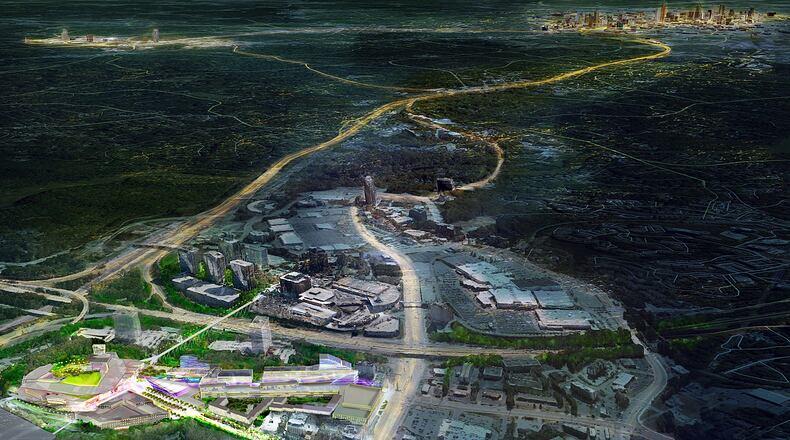New Braves stadium by the numbers:
Seating: 41,500
Private suites: 35-40
Party suites: 6
Public toilets: 647
Concession points of sale: 295
Restaurants: 10
Ticket windows: 20
Source: Draft of stadium development agreement
Just five months after approving the outline of a deal to move the Atlanta Braves to Cobb County, the parties have substantially completed critical negotiations that push the project forward, keep it on schedule and settle many details.
The county released to The Atlanta Journal-Constitution on Wednesday hundreds of pages of documents from draft agreements reached since the Braves’ surprise announcement in November.
The five key agreements address issues big and small — from detailed costs associated with building the ballpark to the number of toilets and concession stands. Many of the finer points in the agreements have not previously been disclosed to the public.
Cobb commissioners will consider the agreements May 27.
Overall cost projections don’t change, but the documents show that the ratio of private to public money could shift. The county and team have consistently highlighted a $672 million project cost, with the Braves spending $372 million, and the county obligated for $300 million.
The current budget in the stadium development agreement frames the deal differently: a “total project cost” at $622 million, with the Braves supplying a minimum of $230 million, a “county contribution” of $368 million and $24 million from other local sources. The county contribution includes $92 million that will be repaid with annual rent payments by the Braves.
The budget says the “maximum stadium costs” could grow by up to $50 million, a discretionary cost the Braves would cover. That would raise the project’s total cost to the $672 million figure.
Braves executive vice president Mike Plant said the additional cost would be to ensure ample parking, depending on the number of spaces the team can lease outside the stadium site.
“There’s not a day that goes by without a meeting about parking,” Plant said. “We are 5,000 parking spots short (at Turner Field), and we’re not going to find ourselves in the same situation up there.”
As it is, the agreements include $61.7 million for parking. Other cost figures cited include $11.1 million to relocate underground gas pipelines and $24.5 million for stadium design and engineering.
If the Braves kick in the $50 million in discretionary funds, their contribution would be about 42 percent of the project cost, not including the future rent payments to the county. If the team’s cost is held to $230 million, it would pay 37 percent of the cost.
The stadium will have about 41,500 seats — 9,000 fewer than at Turner Field — and 40 to 45 suites, compared to Turner Field’s 53. Preliminary plans show 10 restaurants and 28,450 square feet of concessions stands inside the ballpark.
In interviews with the AJC on Wednesday, Plant and Cobb County Commission chairman Tim Lee said the contract drafts released to the newspaper are close to the final versions to be voted upon by Cobb commissioners.
“I don’t anticipate any substantial changes to any of those documents,” Lee said, though he added that small portions might be reworked “as our teams take a breath and step back and look at this.”
Said Plant: “Our teams are going to keep working for the next couple of weeks on tweaking a few of the things in there.”
Both Plant and Lee said the new contracts reflect the same financial arrangement outlined in the memorandum of understanding approved by Cobb commissioners in November.
“The terms and conditions in the MOU have not changed one iota,” Lee said. “If you try to diverge and say these are changing the deal from November, you’re going to be way off the mark.”
The documents also make clear that the Braves are responsible for all construction cost overruns, unless the county requests a change to the stadium that increases costs.
The county will split the cost of property insurance with the Braves on the stadium and parking structures. The Atlanta-Fulton County Recreation Authority is responsible for all of the property insurance at Turner Field. Last year, that amounted to $121,000 for the 17-year-old facility.
The documents also exert a measure of control by the Braves over any county property within a one-mile radius of the site, by prohibiting the county from selling or leasing properties to competitors of Braves’ sponsors.
“It’s just basically to preclude ambushing from a sponsorship standpoint,” Plant said. “We have a big deal with Coke and Delta. We don’t want (the county) selling off pieces of land so somebody can put a big competitor’s sign on it.”
The Braves have agreed to a non-relocation agreement that binds the team to the stadium through 2046.
The definitive agreements, which build on the framework spelled out in the memorandum of understanding, have been negotiated since that initial agreement was approved last November. The process moved more swiftly than negotiations on a new Falcons stadium.
In the Falcons’ negotiations with the city of Atlanta and the Georgia World Congress Center Authority, it took almost 11 months to move from MOU approval in March 2013 to completion of definitive agreements in February 2014.
“There has been a lot of dialogue by a lot of people getting this to this point in a very efficient period of time,” Plant said of the Braves’ agreements.
“It’s the Cobb way,” Lee said. “It’s the way we do things — effective, efficient.”
About the Author





